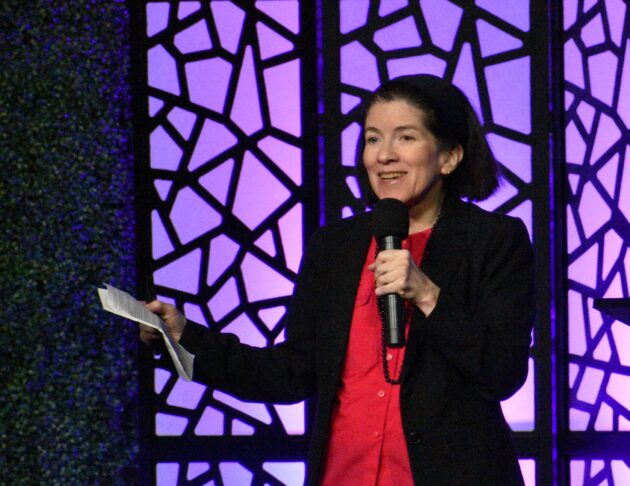
BELLEVUE, Wash. — Three decades ago, Cecilia Aragon made aviation history as the first Latina to earn a place on the U.S. Unlimited Aerobatic Team. She went on to write a book about it, titled “Flying Free.”
Today, she’s still flying free, as a professor and data scientist in the University of Washington — and as the co-founder of a Seattle startup that aims to commercialize her research.
Aragon recounted her personal journey today during a talk at the Women’s Leadership Conference, presented by the Bellevue Chamber. The conference brought nearly 400 attendees to Bellevue’s Meydenbauer Center to hear about topics ranging from financial literacy to sports management.
Aragon’s aerobatic days began in 1985, when she accepted an invitation from a co-worker to take a ride in his flying club’s Piper Cherokee airplane.
“The first thing I thought was, ‘I’m the person who’s scared of climbing a stepladder. I’m scared of going in an elevator,’” she recalled.
But then she thought of her Chilean-born father. “I heard my father’s voice, saying, ‘What is stopping you from doing whatever you want?” she said. She swallowed her fears, climbed into the plane, and was instantly hooked.
“It’s so gorgeous to fly out into the water and see the sun glinting up on the water, like a million gold coins,” she said. “And when we got down to the ground, I said, ‘I want to take flying lessons. I want to be the pilot of my own life.’”
Aragon said she went through three flight instructors, but gradually overcame her fears. “I learned to turn fear into excitement,” she said. The excitement reached its peak in 1991 when she was named to the U.S. aerobatic team — and went on to win bronze medals at the U.S. national and world aerobatic championships.
That wasn’t the only dream that Aragon has turned into reality. After leaving the aerobatic team, she worked as a computer scientist at NASA’s Ames Research Center in Silicon Valley, earned her Ph.D. at Berkeley and became a staff scientist at Lawrence Berkeley National Laboratory. Aragon joined UW’s faculty in 2010 and is now the director of the university’s Human-Centered Data Science Lab.
“I love it,” she said. “My students amaze me and excite me every single day.”
Aragon’s research focuses on how people make sense of vast data sets, using computer algorithms and visualizations. She holds several patents relating to visual representations of travel data — and with the help of UW’s CoMotion Labs and Mobility Innovation Center, Aragon and her teammates have turned that data science into a startup called Traffigram.
For the past year, Traffigram’s small team has been working in semi-stealth mode to develop software that can analyze multiple travel routes, determine the quickest way to get from Point A to Point B, and present the information in an easy-to-digest format. Aragon is the venture’s chief scientist — and her son, Ken Aragon, is co-founder and CEO.
“It’s a family business,” she told GeekWire. “We’ve gotten a great response from potential customers so far, and we’ve raised some money.”
So how does creating a startup compare with aerobatic stunt flying?
“I think there are a lot of similarities, because it’s very risky,” Aragon said. “As they have told me many times, most startup businesses fail. You know, that’s just like what they told me with aerobatics — that very few people make the U.S. aerobatic team, and it’s probably not going to happen. I said, ‘Yeah, but I’m going to enjoy the path I believe in.’ So I believe in the mission we have, to make transportation more accessible to everyone.”

